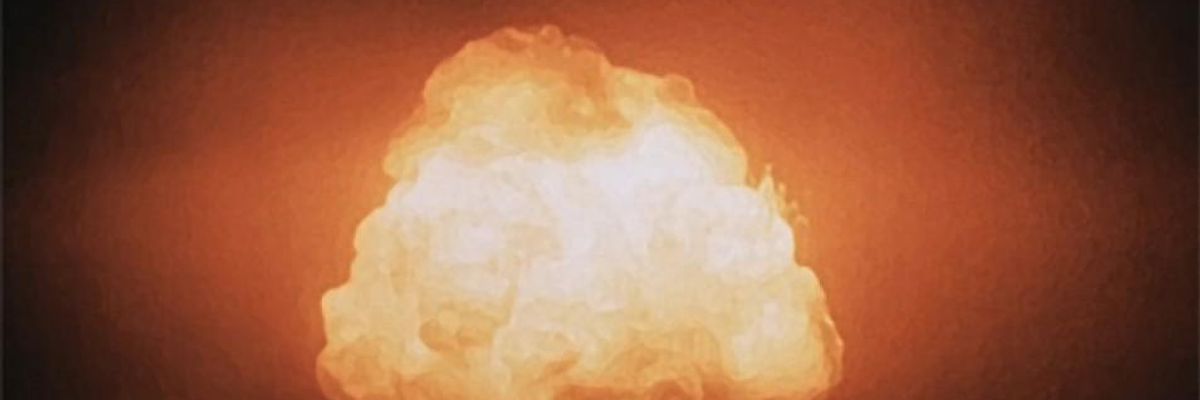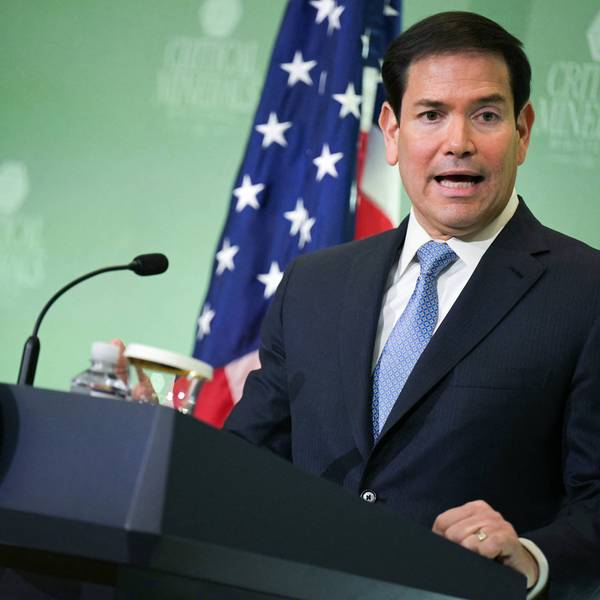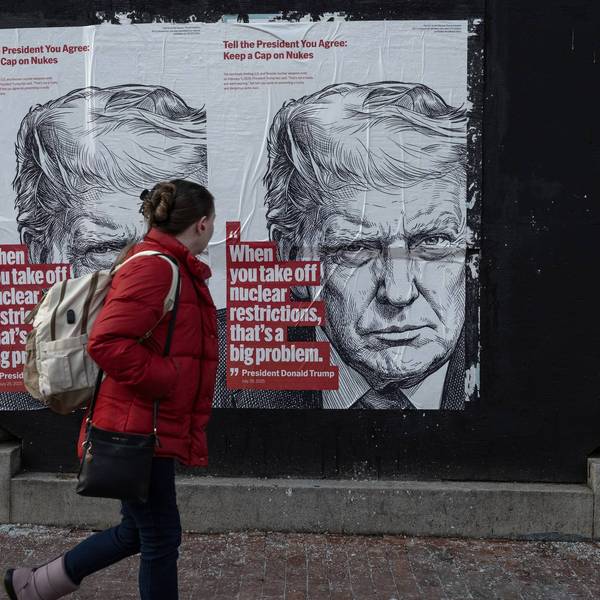
Mushroom cloud seconds after detonation of "the Gadget" by the U.S. military in 1945 at testing range in New Mexico. (Photo: Department of Defense)
Time to Put an End to the Nuclear Age
2020 has been hard enough. The last thing the world needs this year is nuclear weapons.
On September 26, 1983, Soviet military officer Stanislav Petrov got an alert that a U.S. missile attack was imminent.
Faced with the choice of whether to launch a submarine nuclear missile, Petrov made the split-second decision that the alert must have been an error. His choice not to launch a nuclear weapon saved the world from the dreadful prospect of nuclear war.
In Petrov's honor, the world marks September 26 as the International Day for the Total Elimination of Nuclear Weapons.
In 2020, we've dealt with everything from gender reveal parties sparking deadly wildfires to locust swarms, murder hornets, and a global pandemic. So it may feel like talking about nuclear weapons is just the radioactive frosting on an apocalyptic cake.
But nuclear weapons pose one of the gravest threats to human survival, and there are concrete actions world leaders can take right now to make sure they're never used again and eliminated for good.
One such measure is for the United States to officially enact a "No First Use" policy, which would mean that the United States would never launch a nuclear weapon first in a nuclear conflict.
It's far from a symbolic gesture.
In the time that it took me to type those first few paragraphs, a sitting U.S. president could unilaterally decide to launch a nuclear weapon on a whim, without anyone else's authority or approval.
Our current president has gleefully expressed his willingness to use nuclear weapons against both foreign adversaries and hurricanes. He's also expressed a desire to take the nuclear arms race to a new, deadlier stratosphere.
Most Americans don't spend a lot of time worrying about nuclear weapons, even though millions of us live near nuclear facilities or even missiles themselves.
Right now, the risk of nuclear war is the greatest it has been since the height of the Cold War. The Bulletin of Atomic Scientists' Doomsday Clock is set at just 100 seconds to midnight, the closest we've ever been to a nuclear apocalypse in the clock's history.
It doesn't help that President Trump has withdrawn the United States from most of the international arms control agreements that have deescalated tensions and prevented nuclear conflict -- including the Joint Comprehensive Plan of Action (aka the Iran Deal), the Intermediate-Range Nuclear Forces (INF) Treaty, and the Open Skies Treaty.
He's also planning to let the New START Treaty between Russia and the United States expire in February 2021. To top it off, the Trump administration has even reportedly discussed conducting live nuclear tests for the first time since 1992.
Nuclear weapons put us all in danger. We've all got a stake in ensuring that the one planet we've got isn't destroyed in a nuclear holocaust. Even just the smoke and soot from a nuclear war would plunge the world into darkness, causing plummeting global temperatures and the end of life on the planet.
Like Stanislav Petrov, we can save the world from the prospect of nuclear war.
Not everything in the current state of global nuclear weapons policy is doomsday and gloom. We've made some incredible progress in the past couple years.
The historic UN Treaty on the Prohibition of Nuclear Weapons, known as the nuclear ban treaty, was approved by 122 nations in 2017. To date, 84 nations have signed the treaty, and 45 have ratified it. Once 50 nations have ratified the treaty, it officially enters into force.
In honor of Stanislav Petrov, atomic veterans, and survivors and victims of Hiroshima, Nagasaki, and nuclear testing all over the world, let's make 2020 the year when we eliminate nuclear weapons, for good.
An Urgent Message From Our Co-Founder
Dear Common Dreams reader, The U.S. is on a fast track to authoritarianism like nothing I've ever seen. Meanwhile, corporate news outlets are utterly capitulating to Trump, twisting their coverage to avoid drawing his ire while lining up to stuff cash in his pockets. That's why I believe that Common Dreams is doing the best and most consequential reporting that we've ever done. Our small but mighty team is a progressive reporting powerhouse, covering the news every day that the corporate media never will. Our mission has always been simple: To inform. To inspire. And to ignite change for the common good. Now here's the key piece that I want all our readers to understand: None of this would be possible without your financial support. That's not just some fundraising cliche. It's the absolute and literal truth. We don't accept corporate advertising and never will. We don't have a paywall because we don't think people should be blocked from critical news based on their ability to pay. Everything we do is funded by the donations of readers like you. Will you donate now to help power the nonprofit, independent reporting of Common Dreams? Thank you for being a vital member of our community. Together, we can keep independent journalism alive when it’s needed most. - Craig Brown, Co-founder |
On September 26, 1983, Soviet military officer Stanislav Petrov got an alert that a U.S. missile attack was imminent.
Faced with the choice of whether to launch a submarine nuclear missile, Petrov made the split-second decision that the alert must have been an error. His choice not to launch a nuclear weapon saved the world from the dreadful prospect of nuclear war.
In Petrov's honor, the world marks September 26 as the International Day for the Total Elimination of Nuclear Weapons.
In 2020, we've dealt with everything from gender reveal parties sparking deadly wildfires to locust swarms, murder hornets, and a global pandemic. So it may feel like talking about nuclear weapons is just the radioactive frosting on an apocalyptic cake.
But nuclear weapons pose one of the gravest threats to human survival, and there are concrete actions world leaders can take right now to make sure they're never used again and eliminated for good.
One such measure is for the United States to officially enact a "No First Use" policy, which would mean that the United States would never launch a nuclear weapon first in a nuclear conflict.
It's far from a symbolic gesture.
In the time that it took me to type those first few paragraphs, a sitting U.S. president could unilaterally decide to launch a nuclear weapon on a whim, without anyone else's authority or approval.
Our current president has gleefully expressed his willingness to use nuclear weapons against both foreign adversaries and hurricanes. He's also expressed a desire to take the nuclear arms race to a new, deadlier stratosphere.
Most Americans don't spend a lot of time worrying about nuclear weapons, even though millions of us live near nuclear facilities or even missiles themselves.
Right now, the risk of nuclear war is the greatest it has been since the height of the Cold War. The Bulletin of Atomic Scientists' Doomsday Clock is set at just 100 seconds to midnight, the closest we've ever been to a nuclear apocalypse in the clock's history.
It doesn't help that President Trump has withdrawn the United States from most of the international arms control agreements that have deescalated tensions and prevented nuclear conflict -- including the Joint Comprehensive Plan of Action (aka the Iran Deal), the Intermediate-Range Nuclear Forces (INF) Treaty, and the Open Skies Treaty.
He's also planning to let the New START Treaty between Russia and the United States expire in February 2021. To top it off, the Trump administration has even reportedly discussed conducting live nuclear tests for the first time since 1992.
Nuclear weapons put us all in danger. We've all got a stake in ensuring that the one planet we've got isn't destroyed in a nuclear holocaust. Even just the smoke and soot from a nuclear war would plunge the world into darkness, causing plummeting global temperatures and the end of life on the planet.
Like Stanislav Petrov, we can save the world from the prospect of nuclear war.
Not everything in the current state of global nuclear weapons policy is doomsday and gloom. We've made some incredible progress in the past couple years.
The historic UN Treaty on the Prohibition of Nuclear Weapons, known as the nuclear ban treaty, was approved by 122 nations in 2017. To date, 84 nations have signed the treaty, and 45 have ratified it. Once 50 nations have ratified the treaty, it officially enters into force.
In honor of Stanislav Petrov, atomic veterans, and survivors and victims of Hiroshima, Nagasaki, and nuclear testing all over the world, let's make 2020 the year when we eliminate nuclear weapons, for good.
On September 26, 1983, Soviet military officer Stanislav Petrov got an alert that a U.S. missile attack was imminent.
Faced with the choice of whether to launch a submarine nuclear missile, Petrov made the split-second decision that the alert must have been an error. His choice not to launch a nuclear weapon saved the world from the dreadful prospect of nuclear war.
In Petrov's honor, the world marks September 26 as the International Day for the Total Elimination of Nuclear Weapons.
In 2020, we've dealt with everything from gender reveal parties sparking deadly wildfires to locust swarms, murder hornets, and a global pandemic. So it may feel like talking about nuclear weapons is just the radioactive frosting on an apocalyptic cake.
But nuclear weapons pose one of the gravest threats to human survival, and there are concrete actions world leaders can take right now to make sure they're never used again and eliminated for good.
One such measure is for the United States to officially enact a "No First Use" policy, which would mean that the United States would never launch a nuclear weapon first in a nuclear conflict.
It's far from a symbolic gesture.
In the time that it took me to type those first few paragraphs, a sitting U.S. president could unilaterally decide to launch a nuclear weapon on a whim, without anyone else's authority or approval.
Our current president has gleefully expressed his willingness to use nuclear weapons against both foreign adversaries and hurricanes. He's also expressed a desire to take the nuclear arms race to a new, deadlier stratosphere.
Most Americans don't spend a lot of time worrying about nuclear weapons, even though millions of us live near nuclear facilities or even missiles themselves.
Right now, the risk of nuclear war is the greatest it has been since the height of the Cold War. The Bulletin of Atomic Scientists' Doomsday Clock is set at just 100 seconds to midnight, the closest we've ever been to a nuclear apocalypse in the clock's history.
It doesn't help that President Trump has withdrawn the United States from most of the international arms control agreements that have deescalated tensions and prevented nuclear conflict -- including the Joint Comprehensive Plan of Action (aka the Iran Deal), the Intermediate-Range Nuclear Forces (INF) Treaty, and the Open Skies Treaty.
He's also planning to let the New START Treaty between Russia and the United States expire in February 2021. To top it off, the Trump administration has even reportedly discussed conducting live nuclear tests for the first time since 1992.
Nuclear weapons put us all in danger. We've all got a stake in ensuring that the one planet we've got isn't destroyed in a nuclear holocaust. Even just the smoke and soot from a nuclear war would plunge the world into darkness, causing plummeting global temperatures and the end of life on the planet.
Like Stanislav Petrov, we can save the world from the prospect of nuclear war.
Not everything in the current state of global nuclear weapons policy is doomsday and gloom. We've made some incredible progress in the past couple years.
The historic UN Treaty on the Prohibition of Nuclear Weapons, known as the nuclear ban treaty, was approved by 122 nations in 2017. To date, 84 nations have signed the treaty, and 45 have ratified it. Once 50 nations have ratified the treaty, it officially enters into force.
In honor of Stanislav Petrov, atomic veterans, and survivors and victims of Hiroshima, Nagasaki, and nuclear testing all over the world, let's make 2020 the year when we eliminate nuclear weapons, for good.

